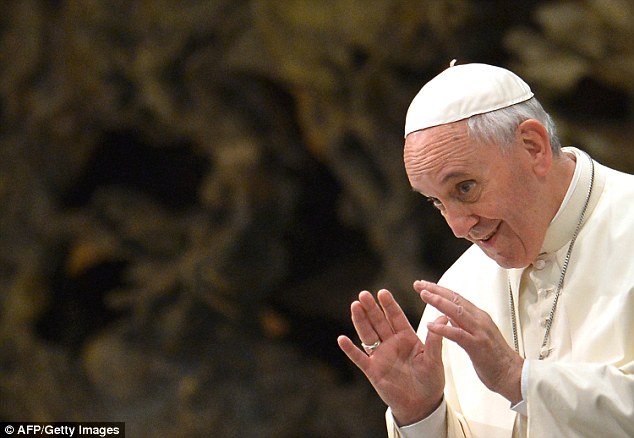“[The Pope] enjoys in virtue of his office, when, as the supreme shepherd and teacher of all the faithful, who confirms his brethren in their faith (Luke 22:32), he proclaims by a definitive act some doctrine of faith or morals. Therefore his definitions, of themselves, and not from the consent of the Church, are justly held irreformable, for they are pronounced with the assistance of the Holy Spirit, an assistance promised to him in blessed Peter.” – Vatican II

The Romish church teaches that the Pope of Rome is infallible, at least when speaking of doctrine and morals, independently of consent of the church. Although Roman Catholics claim that Protestants misunderstand the doctrine of papal infallibility, the words of Vatican II are incredibly clear. The Pope cannot be corrected when he is speaking in the official capacity as the heir of Peter. What he says is, quite literally, the words of God. Put succinctly, the Roman Catholic church teaches that the Holy Spirit preserves the Pope from all doctrinal and moral error.
It’s with irony then that Roman Catholic officials are frantically trying to correct Pope Francis of what virtually everyone acknowledges is a daily departure from Roman Catholic orthodoxy on a whole host of issues. Last month, more than 40 Roman Catholic leaders officially accused Francis of seven heresies. Yesterday, a Capuchin Friar – who happens to be an appointed official at the Vatican on the International Theological Commission – wrote his own corrective letter to the one who is supposedly infallible.
While not signing on to the “Filial Correction,” the aforementioned accusation of heresy, Friar Thomas Weinandy claims that God gave him an omen affirming his decision to doctrinally wrist slap the supposed Infallible One. He says…
“If you want me to write something, you have to give me a clear sign. Tomorrow morning, I’m going to Saint Mary Major’s to pray, and then I am going to Saint John Lateran. After that, I’m coming back to Saint Peter’s to have lunch with a seminary friend of mine. During that interval, I must meet someone that I know but have not seen in a very long time, and would never expect to see in Rome at this time. That person cannot be from the United States, Canada or Great Britain. Moreover, that person has to say to me, ‘Keep up the good writing’.”
According to an interview with Crux Magazine, Weinandy said that he ran into an archbishop he had not seen for over twenty years, who congratulated him for a book he had written on “the immutability of God and the Incarnation” and to “keep up the good writing.” “There was no longer any doubt in my mind that Jesus wanted me to write something,” Weinandy said. “I also think it significant that it was an Archbishop that Jesus used. I considered it an apostolic mandate.”
Of course, archbishops are not bestowed with doctrinal infallibility, and neither are mere friars. Signs from Jesus aside, one would think that the very notion of a Pope with serious doctrinal error would make the friar rethink his commitment to a cult so intrinsically tied to that idea. He writes to the supposed Infallible One…
I write this letter with love for the Church and sincere respect for your office. You are the Vicar of Christ on earth, the shepherd of his flock, the successor to St. Peter and so the rock upon which Christ will build his Church. All Catholics, clergy and laity alike, are to look to you with filial loyalty and obedience grounded in truth. The Church turns to you in a spirit of faith, with the hope that you will guide her in love.
Yet, Your Holiness, a chronic confusion seems to mark your pontificate. The light of faith, hope, and love is not absent, but too often it is obscured by the ambiguity of your words and actions. This fosters within the faithful a growing unease. It compromises their capacity for love, joy and peace.
The friar’s chief concerns with the Pope is that he spoke heresy in regards to his infamous Amoris Laetitia on the topic of divorce (this topic in particular seems to have stirred up more conservative Roman Catholics). He also asserts that the Pope undermines the importance of doctrine, downplaying the church’s teaching on a whole host of issues. You can read the letter here.
How did the Pope receive this criticism?
The Roman Catholic church immediately asked for his resignation. The United States Bishop Conference, which has the power to do so, demanded the resignation of Friar Weinandy. He will no longer be serving as a doctrinal consultant to the church. There certainly is no room to question the one believed to be doctrinally infallible.











